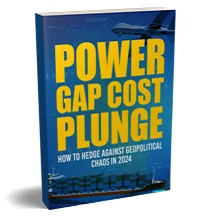
Iron-ore prices also dropped. Oil did too…falling below $50 a barrel. Still, commodity prices could fall even further.
According to Morgan Stanley, the ongoing oil slump could be the worst crash in more than 45 years. The rationale is simple to follow. In short, at this point in an oil price decline cycle, production would have tapered back and, hence, supply would have dropped.
A reduction in supply would be the precursor to a price recovery. Yet this time around, even though oil prices have fallen, supply has increased. This is completely illogical.
Following the price collapse earlier this year, U.S. production has leveled off. This is what one would expect. But, for whatever reason, OPEC production hasn’t decreased or even been flat. Instead, it has increased from roughly 30.5 million barrels per day in January to over 32 million barrels per day in June. What to make of it?
This Wasn’t Supposed to Happen
“For now, Morgan Stanley is sticking with its original thesis that prices will improve, largely because OPEC doesn’t have much more spare capacity to fill and because oil stocks have already been hammered, reported Bloomberg.
“But another possibility is that the supply of new oil coming from outside the U.S. may continue to increase as sanctions against Iran dissolve and if the situation in Libya improves, the Morgan Stanley analysts said. U.S. production could also rise again. A recovery is less certain than it once was, and the slump could last for three years or more—‘far worse than in 1986.’
‘“In that case,’ they wrote, “there would be little in analyzable history that could be a guide’ for what’s to come.”
Obviously, new supply in the face of falling prices will push prices down further. But why would additional supply be dumped on the market? It makes no sense.
Nonetheless, we can’t deny the possibility. A surge in production over the last several months wasn’t supposed to happen. Yet it did. Certainly, there’s the potential it could continue.
Oil prices have already fallen about 55 percent from their peak of $107 a barrel in June 2014. But, through it all, production continues to increase. “We’re in uncharted territories with inventories building at this time of year,” said John Macaluso, an analyst at Tyche Capital Advisors.
The Perfect Storm Bearing Down Upon Us
The real story, however, is not that commodity prices are falling. Rather, it’s that the world economy’s stagnating. Demand for oil and raw materials are disappearing.
If the world economy was strong and growing, demand for commodities would be increasing. Similarly, commodity prices would be increasing too. Falling prices is a strong indicator the world economy is cooling.
‘“This commodity bear market is like a train wreck in slow motion,’ said Andy Pfaff, the chief investment officer for commodities at MitonOptimal in Cape Town. ‘It has a lot of momentum and doesn’t come to a sudden stop.’
“Investors are fleeing raw materials as the Federal Reserve moves closer to raising borrowing costs and economic growth expands at the slowest pace since 1990 in China, the biggest commodities user. Muted demand from other emerging markets and prospects for more oil supply are adding to the bearish sentiment that UBS Group AG strategist Julian Emanuel described as a ‘perfect storm.”’
A perfect storm, if you recall, refers to an event where a rare confluence of circumstances result in an event of unusual magnitude. Here at the Economic Prism we watch, and prepare…and set our rigging tight for the perfect storm bearing down upon us.
Sincerely,
MN Gordon
for Economic Prism
Return from The Perfect Storm Bearing Down Upon Us to Economic Prism





